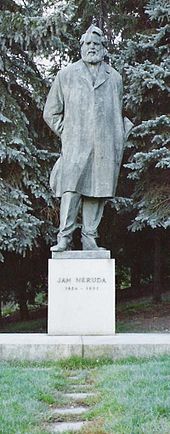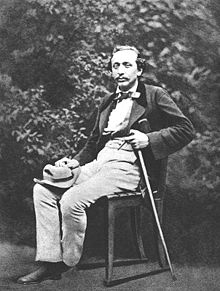Jan Neruda
Jan (Nepomuk) Neruda (born July 9, 1834 in Prague , Austrian Empire ; † August 22, 1891 ibid) was a Bohemian journalist and writer .
Life
Neruda was born on the Lesser Town of Prague in the steeply rising Spornergasse no. 233 in the house to the two suns as the son of a small trader. His mother Barbora Nerudová (1795–1869) was the long-time housekeeper of the geologist Joachim Barrande . The Spornergasse was later renamed Nerudova ulice after him . Jan Neruda spent almost his entire life there, with interruptions. Although he came from a humble background, he graduated from an academic high school in 1845 and studied for a few semesters at the philosophical faculty of Charles University in Prague, worked temporarily as a teacher and at daily newspapers. From 1856 he worked for the German-speaking daily messenger from Bohemia , from 1865 to 1891 editor of the important liberal Czech newspaper Národní listy , and later for Pictures of Homeland (Obrazy domova) and Time (Čas). He co-founded the literary magazines Květy and Lumír and the poetry series Poetické besedy . He had been at the center of Czech cultural life since the late 1950s, but in the 1880s, being seriously ill, became increasingly lonely and economically distressed.

In the course of his life, Jan Neruda wrote over 2000 features , published poems, dramas, travelogues, art reviews, sympathized with the artist group Májovci , felt connected to the task of the Czech national rebirth and valued the novels of his contemporary Jules Verne . In 1871 he was called a traitor to the nation by unknown institutions, left Prague and traveled through other countries of the Austro-Hungarian monarchy , came to Vienna and Graz and was in Germany , France , Hungary , Italy , Greece and Egypt , as his travel reports from this period can be seen, which are an interesting testimony to his life and contemporary society.
Jan Neruda remained unmarried, but dedicated many of his love poems to his first childhood sweetheart Anna Holinová. Another love was the married writer Karolína Světlá , whom he described as an ideal woman. His third wife, whom he loved, to whom he dedicated several of his publications, was Terezie Marie Macháčková (1847–1863), daughter of the civil servant and politician Josef Macháček , who died after a brief acquaintance. At the age of 50 he is said to have fallen in love with a young girl named Božena.
Since Neruda felt misunderstood throughout his life, he developed a negative attitude towards his fellow human beings, which was intensified by a serious illness. He had alcohol problems and lived in difficult economic circumstances all his life.

The poverty is a recurring motif in all publications of Jan Neruda. Nostalgic elements alternate with feelings of oppression, alienation and being buried alive. From the 1860s he published several anti-Jewish texts, and in the publication Die Angst vor dem Judentum (Pro strach židovský) (1869) (based on Richard Wagner's essay Das Judenthum in der Musik ), Neruda assumed that the Jews were one because of their alleged affinity for money dangerous power threatening the whole world, called on the peoples to unite more closely against this “danger” (especially economically) and advocated “emancipation away from Judaism”.
The Chilean Nobel Prize Winner for Literature Neftali Ricardo Reyes Basualto chose the last name of his pseudonym Pablo Neruda in memory of Jan Neruda.
Jan Neruda introduced a special kind of realism into the Czech-language literature of the 19th century. He expressed his self-confident journalistic commitment - quite modern and generally applicable - with the words:
“Above all, it is necessary that we learn to understand people, that we study their needs, their joys and sorrows, so we mainly need, for example, faithful stories from life, pictures of people from all walks of life, collections of true examples an unimagined and real experience. "
Works (overview)
- Neruda wrote poems, travelogues, ballads, novels, art reviews, but also unsuccessful plays. As collected texts, last edited by the Institute for Czech Literature and Literary Studies at Charles University in Prague in 49 volumes, 1950 ff. Not available in bookshops.
- Cemetery flowers . Poems in the Czech language, 1858.
- As a journalist, Jan Neruda is also known as the inventor of the Bohemian-Czech feuilleton. In 1863 he brought the book Five Weeks in a Balloon by Jules Verne from Paris . He is said to have considered it a curiosity worth communicating and translated it under the pseudonym J. Drn.
- Pictures from old Prague , Czech: Arabesky a Jiné . 1864, German 1883/84, current edition: Tales from Old Prague , Reclam, Stuttgart 1992, ISBN 3-15-008770-8 , translated by Josef Mühlberger and Hans Gärtner .
- Lesser Quarter Stories , Czech: Povídky malostranské 1877, German 1885; Current edition translated by Franz Jurenka, Vitalis, Furth im Wald 2005, ISBN 3-89919-016-5 . With an afterword by Hugo Rokyta and illustrations by Karel Hruška. The Lesser Quarter Stories are Jan Neruda's most famous publication. Using his memories, he drew a picture of the Lesser Town in Prague before the Slavs Congress and the Prague Whitsun Uprising from June 2nd to 19th, 1848, which he witnessed as a 14-year-old, describes the life of the petty bourgeoisie between the palaces and the backyards, describes them with humor Properties, criticizes the local life of feudalism and gives insight into the incipient Pan-Slavism .
- Vile and insulting jokes , in the Czech language, 1877.
- Cosmic songs , in the Czech language, inspired by reading the writer Jules Verne , 1878.
- Good Friday chants , in Czech, 1896.
- The dogs of Constantinople: Travel Pictures , DVA Stuttgart 2007, ISBN 978-3-421-05254-4 , translated by Christa Rothmeier ( Czech Library ).
Some of his books contain illustrations by Adolf Kašpar .
literature
- Constantin von Wurzbach : Neruda, Johann . In: Biographisches Lexikon des Kaiserthums Oesterreich . 20th part. Kaiserlich-Königliche Hof- und Staatsdruckerei, Vienna 1869, p. 188 f. ( Digitized version ).
- Brockhaus encyclopedia . Volume 13, ISBN 3-7653-4142-8 .
- Gero von Wilpert : Lexicon of world literature . Volume 1, 1975.
- R. Havel: Neruda Jan. In: Austrian Biographical Lexicon 1815–1950 (ÖBL). Volume 7, Verlag der Österreichischen Akademie der Wissenschaften, Vienna 1978, ISBN 3-7001-0187-2 , p. 69 f. (Direct links to p. 69 , p. 70 ).
- Slovník českých spisovatelů. published by Ústav pro Českou Literaturu ČSAV s redakčním kruhem Jaroslav Kolár, Československý Spisovatel, Prague 1964, OCLC 310894745 .
- Biographical lexicon on the history of the Bohemian lands . Published on behalf of the Collegium Carolinum (Institute) by Ferdinand Seibt , Hans Lemberg and Helmut Slapnicka. Volume III, Oldenbourg, Munich 2000, ISBN 3-486-55973-7 , pp. 24-25.
- Michal Frankl: Neruda, Jan. In: Wolfgang Benz (Hrsg.): Handbuch des Antisemitismus. Enmity against Jews in the past and present . Volume 2/2: People L – Z. De Gruyter Saur, Berlin 2009, ISBN 978-3-598-24072-0 , pp. 579f.
Web links
- Literature and other media by and about Jan Neruda in the catalog of the National Library of the Czech Republic
- Literature by and about Jan Neruda in the catalog of the German National Library
Individual evidence
- ^ Johanna von Herzogenberg : Prague. A leader . Prestel Verlag, 1966, p. 113 ff.
- ↑ Karl Plicka, Emanuel Poche: Prague, an image guide . Texts on Nerudova, Panorama 1982, pp. 74f.
- ↑ Heribert Sturm : Biographical Lexicon for the History of the Bohemian Countries . Published on behalf of the Collegium Carolinum (Institute) , Volume II, R. Oldenbourg Verlag, Munich 2984, ISBN 3-486-52551-4 , p. 531.
- ^ Radio Prague's Virtual Cemetery - Jan Neruda , www.archiv.radio.cz
- ^ Oskar Donath: Jewish in the new Czech literature. In: Samuel Steinherz (Ed.): Yearbook of the Society for the History of Jews in the Czechoslovak Republic. 1931 (year III). Textor Verlag, Frankfurt 2008, p. 7f.
- ↑ Michal Frankl: Neruda, Jan. In: Wolfgang Benz (Hrsg.): Handbuch des Antisemitismus Judenfeindschaft in past and present. Volume 2/2, de Gruyter, Berlin 2009, p. 579 f.
- ↑ The Nobel Prize in Literature 1971 - Pablo Neruda In the official short biography on the Nobel Prize Committee page it says: “In 1920, he became a contributor to the literary journal 'Selva Austral' under the pen name of Pablo Neruda, which he adopted in memory of the Czechoslovak poet Jan Neruda. "
| personal data | |
|---|---|
| SURNAME | Neruda, Jan |
| ALTERNATIVE NAMES | Neruda, Jan Nepomuk (full name); J. Drn (pseudonym) |
| BRIEF DESCRIPTION | Czech journalist, poet and writer |
| BIRTH DATE | July 9, 1834 |
| PLACE OF BIRTH | Prague |
| DATE OF DEATH | August 22, 1891 |
| PLACE OF DEATH | Prague |
